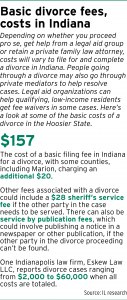Subscriber Benefit
As a subscriber you can listen to articles at work, in the car, or while you work out. Subscribe NowThere’s an emotional cost that comes with a divorce, but the process also involves dollars and cents.
Whether it’s the basic filing fee, paying a mediator to try and resolve the case, or retaining a private attorney, a person going through a divorce can pay a little or a lot, depending on what their case entails, if children and/or considerable property and assets are involved, and how amicable the split is.
Some people represent themselves, while others enlist the help of legal aid organizations or programs tailored for residents with limited financial means.
What a divorce ultimately can cost varies widely.
A Forbes article from 2022 estimated the median cost of a divorce in the U.S. is $7,000, while the average is between $15,000 and $20,000.

Jonathan Stewart, a senior attorney at Indianapolis Legal Aid Society, said his impression, based on feedback he’s received, is that if a person seeking divorce hires an attorney, a retainer fee costs on average about $1,500.
“There are others that are higher for sure,” Stewart said.
Clio’s 2023 Legal Trends Report for Indiana lists the average hourly rate for a family law attorney as $258 an hour.
Stewart has been at the legal aid organization for about 30 years.
“I would say there are more people that attempt to file pro se now,” he said.
For those who do proceed pro se, Stewart said the divorce forms provided by Indiana Legal Help are better now than what used to be available. Indiana Legal Help was created in 2018 to help Hoosiers connect with free and low-cost legal aid for noncriminal issues including family law, housing and health care, according to the site.
How a divorce proceeds depends on what’s at stake. Stewart said cases can be simple to help with, or can get more complicated — for example, if a child support worksheet is involved.
Legal aid assistance, basic costs
Stewart estimated that 20-25% of the cases ILAS takes are family law-related.
The organization provides services free of charge to individuals and families with incomes of less than 125% of the federal poverty guideline levels, according to its website. If someone’s income is above the organization’s guidelines, they may be referred to a member of a Lawyer Referral Service.
In 2022, ILAS had 598 initial consultations for divorce cases, Stewart said. But it can’t take everybody that qualifies under the guidelines.

Tracy Pappas, managing attorney in Indiana Legal Services’ Indianapolis office, said a basic filing fee in Indiana for a divorce is $157, with some counties, including Marion, adding an additional $20.
Stewart said his organization can typically get filing fees waived.
Other fees associated with a divorce could include a $28 sheriff’s service fee if the other party in the case needs to be served, Pappas said. Also, there can be service-by-publication fees, which could involve publishing a notice in a newspaper or other publication if the other party in the divorce proceeding can’t be found.
 People going through a divorce may also go through private mediators to help resolve cases and avoid trials.
People going through a divorce may also go through private mediators to help resolve cases and avoid trials.
Divorce is definitely one of Indiana Legal Services’ most requested areas for legal assistance, Pappas said. She said there were a little more than 2,500 applications statewide last year for divorce assistance across Indiana Legal Services’ offices, representing roughly 10% of the organization’s case applications.
Like the Indianapolis Legal Aid Society and other legal assistance groups, Indiana Legal Services has income eligibility guidelines.
“We get a lot of applications from people who aren’t eligible,” Pappas said.
Stewart said he’s seen a lot of cases where a person tries to represent themselves pro se in a divorce case but ends up turning to Indianapolis Legal Aid Society for assistance.
“I have finished up probably nearly as many cases as I’ve started,” he said.
Stewart pointed to the Indianapolis Bar Association’s Family Law Modest Means Panel as a good program that covers areas of law including representation in actions for dissolution, post-dissolution, legal separation, custody and support, juvenile court issues, adoption, guardianship, paternity, protective/restraining order, children in need of services and termination of parental rights cases.
For a person to qualify for a referral to a modest means panel attorney, that person must be referred by a qualifying agency or by an IndyBar attorney member, according to IndyBar.
Private practice perspective

Yasmin Abdelhak Barker, an attorney with Eskew Law LLC, said she gets a lot of questions from potential clients during consultations about how much their divorce will cost.
“There’s really no good way to quantify it,” Barker said.
There are a lot of factors to consider in divorce cases, including the extent of discovery, travel and children, among others.
“I try to prepare them as best as I can on my end,” Barker said, referring to the possible costs.
People generally know that in a high conflict divorce where the parties don’t see eye to eye, it may cost more, Barker said. She added that Marion County requires mediation in family law cases before a case goes to trial.
Mediation tends to be very successful, Barker said. But she acknowledged, “Neither party is going to walk away with everything they wanted.”
Mediators work on an hourly rate, just like attorneys. Barker noted Marion County offers a modest means mediation program for low-income parties.
Coming into her third year as an attorney, Barker said she thinks the number of divorces has stayed pretty consistent. The majority of her cases are divorces, she said.
Like Stewart, Barker said she has worked with clients that, at first, tried to represent themselves pro se in a divorce proceeding, but decided they needed representation.
“The family law community in Marion County is very, very busy,” she said.•
Please enable JavaScript to view this content.
